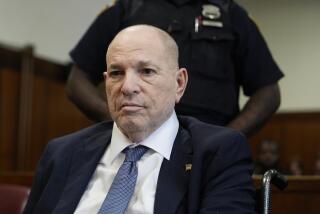Prosecution ends Harvey Weinstein case, calling ex-mogul an âabusive rapistâ who relied on âpower, manipulationâ
NEW YORK â In her closing arguments Friday, the lead prosecutor in Harvey Weinsteinâs rape trial proclaimed that power, manipulation and abuse â as well as a âlack of human empathyâ â are what led the former producer to the charges he now faces in Manhattan criminal court.
Assistant Dist. Atty. Joan Illuzzi-Orbon told the jury of seven men and five women that Weinstein had underestimated his accusers.
âHe made sure he had contact with the people he was worried about as a little check to make sure that one day, they wouldnât walk out from the shadows and call him exactly what he was: an abusive rapist,â she said. âHe was wrong.â
The prosecutionâs final argument was designed to undercut the seeds of doubt painstakingly planted by Weinsteinâs attorneys over three weeks of testimony.
Throughout the trial, the defense has repeatedly seized on the fact that accusers Mimi Haley and Jessica Mann kept in contact â and in Mannâs case, engaged in consensual sex â with Weinstein after their alleged assaults.
The continued communication, coupled with some incomplete and inconsistent testimony from Weinsteinâs other accusers, could sway the jury toward an acquittal, legal experts say.
Illuzi charged that Weinstein kept in contact with his victims in order to control and isolate them. The Miramax co-founder dangled roles in front of his accusers, she said, some of whom were trying to establish acting careers.
The prosecutor outlined the ways in which the accounts of abuse were strikingly similar: Interactions with Weinstein that fluctuated between validating and humiliating. The producerâs rapid changes in demeanor, sometimes from friendly to menacing in a matter of moments. And aggressive overtures that were either physically or mentally difficult â if not impossible â to resist.
âWhen you have to trick somebody to be in your control,â Illuzzi said, âthen you know that you donât have consent.â
In her closing arguments Thursday, lead defense attorney Donna Rotunno implored the jury to focus on the evidence presented at trial rather than the maelstrom of negative press Weinstein has received between the start of the #MeToo movement and his trial.
In all, more than 90 women have come forward with sexual misconduct allegations against Weinstein.
âYou may have had a gut feeling that Harvey Weinstein was guilty,â Rotunno said. âThrow that gut feeling right out the window.â
Rotunno also argued that Weinsteinâs accusers made the choice to go to his apartment or his hotel room, that they made the choice to engage in sex with him, and that they should take responsibility for those choices.
Illuzzi rebuffed those claims.
âIf you take the short way home and walk through a dark park and get robbed, nobodyâs going to say, âYou shouldnât have been walking through the dark park,ââ Illuzzi said.
But victims of sexual assault are viewed differently than those of other crimes, she said, and are often blamed with putting themselves in such situations.
Harvey Weinstein trial: Memory expert and UC Irvine professor Elizabeth Loftus testifies for defense
Psychologist Elizabeth Loftus testified for the defense in Harvey Weinsteinâs rape trial Friday, laying out how, she says, memory can become distorted.
Weinstein, 67, faces five felony charges in the New York trial, including rape, criminal sexual assault and predatory sexual assault. He faces a minimum of 25 years in prison and could be locked away for the rest of his life if convicted on the last charge.
The charges stem from accusations by Haley, a former employee of Weinsteinâs production company who alleges he forcibly performed oral sex on her in 2006, and Mann, a former aspiring actress who testified that the producer raped her in a New York hotel room in 2013.
To earn a conviction on the predatory sexual assault charge, prosecutors must convince jurors that Weinstein assaulted Haley or Mann, as well as âSopranosâ actress Annabella Sciorra.
Three other women testified that Weinstein assaulted them. Those alleged crimes were either too old to prosecute or happened outside the jurisdiction of the Manhattan district attorneyâs office, but the allegations of one of the women, Lauren Young, about an assault that she said occurred in a Beverly Hills hotel, led prosecutors to file charges against Weinstein in Southern California.
Weinstein has denied any wrongdoing and pleaded not guilty to all charges. Jury deliberations are expected to begin Tuesday.
In a direct rebuke of the defenseâs argument that Weinsteinâs accusers sought attention through their involvement in the sensational case, Illuzzi said they were instead âcompelled by their own morality.â
âWould they put themselves through the stress? Did it look like they were having fun up there? Did it look like that was a party, was that a premiere?â Illuzzi said. âOr did it look like that was horrible and grueling?â
Newberry reported from New York and Queally from Los Angeles.
More to Read
Sign up for Essential California
The most important California stories and recommendations in your inbox every morning.
You may occasionally receive promotional content from the Los Angeles Times.












